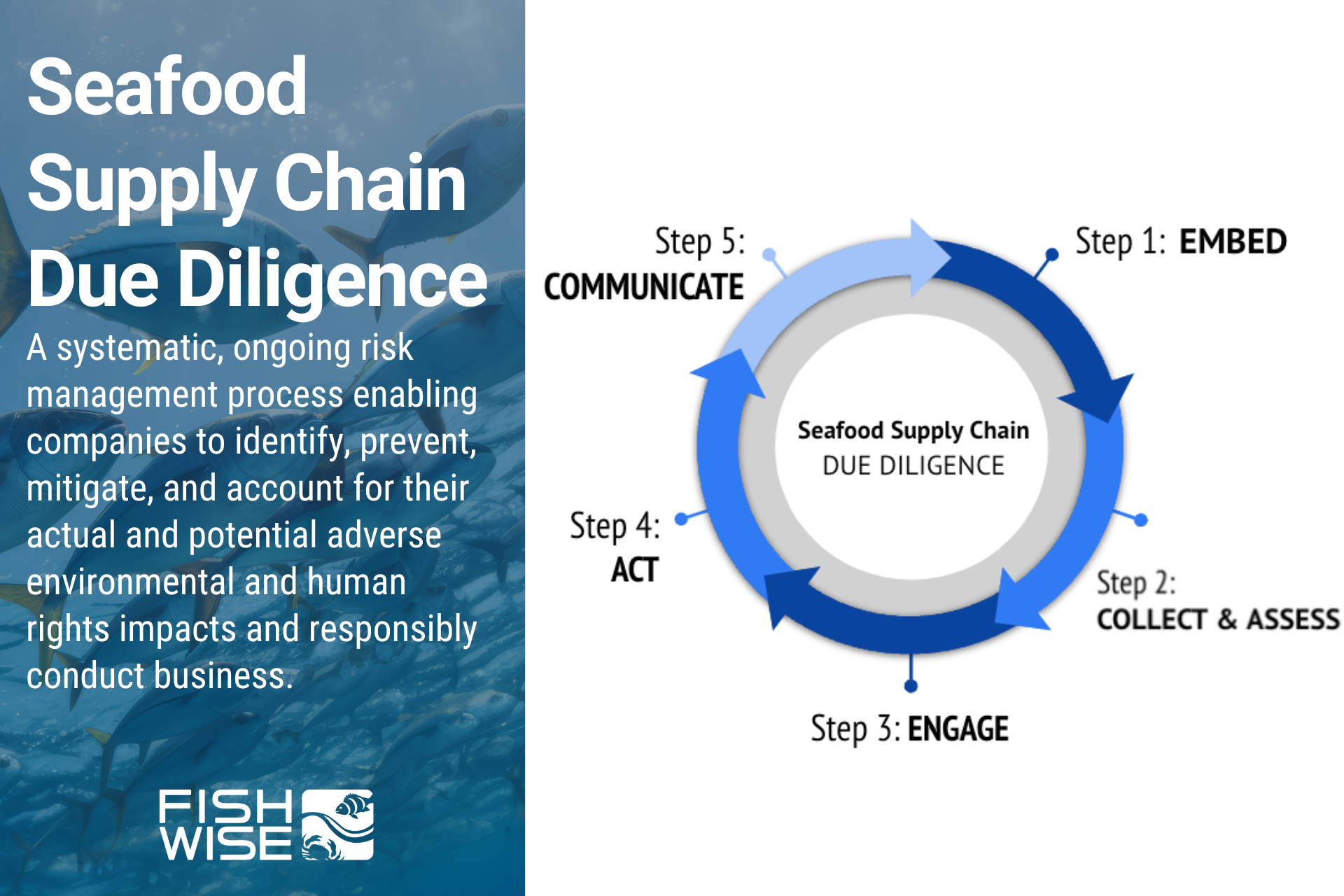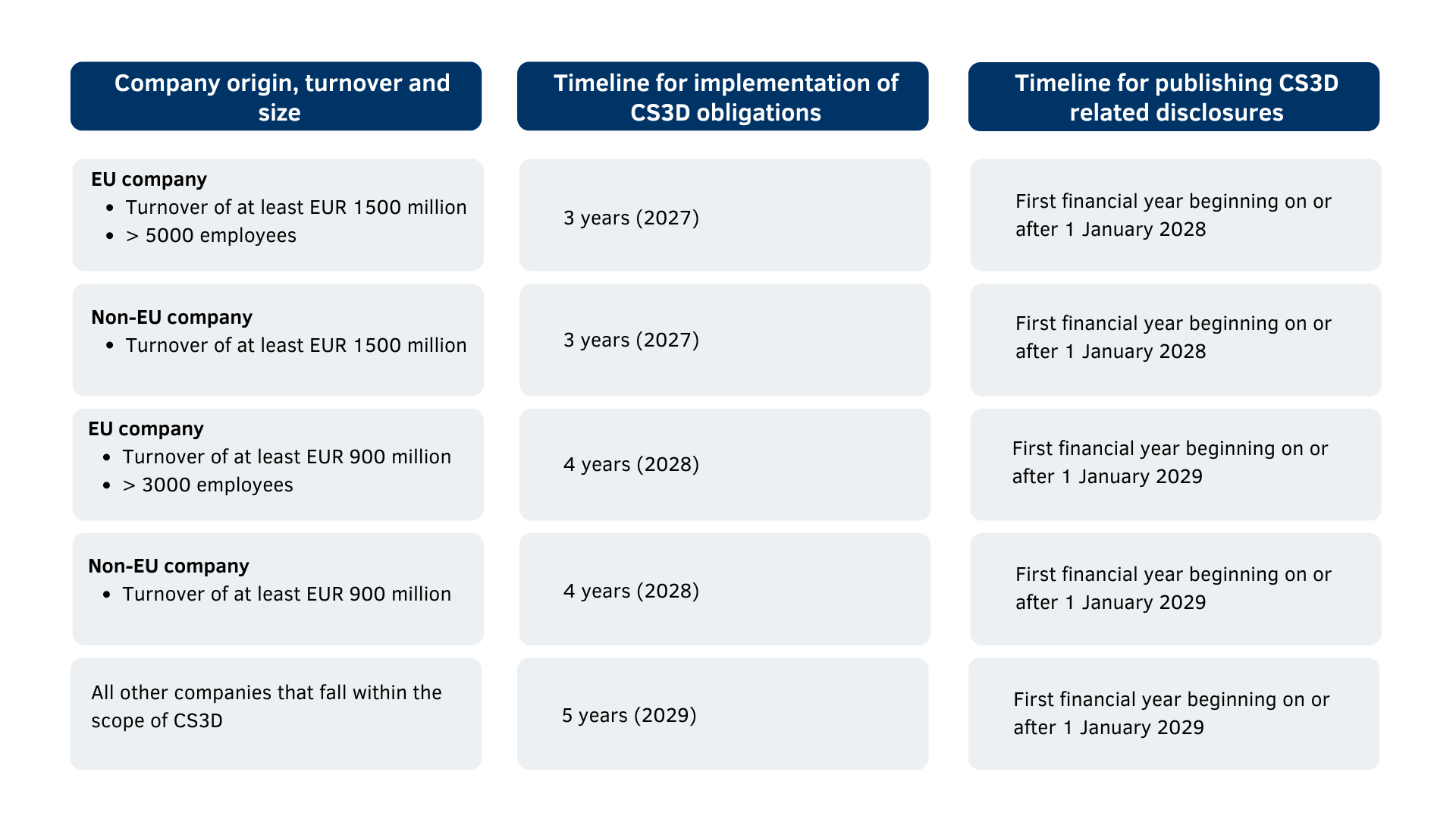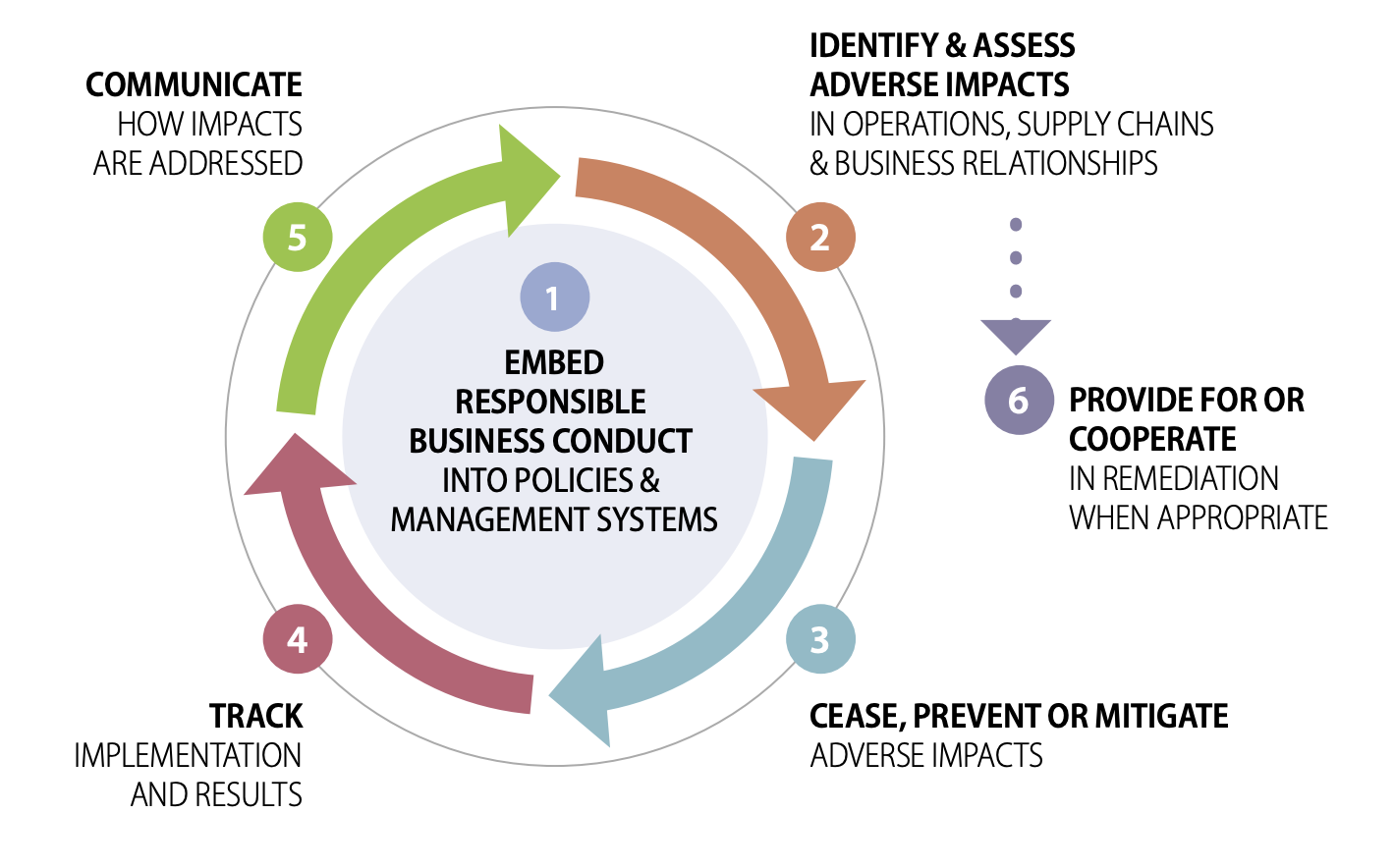Mandatory Human Rights Due Diligence, Forced Labor Import Bans, National Action Plans
In the last few years, there has been a slew of new pieces of legislation, trade enforcement measures, and other government efforts across the globe to promote responsible business conduct related to human rights and environmental issues. Perhaps the most significant recent governmental action is the Corporate Sustainability Due Diligence Directive (CS3D) out of the European Union, which will likely have global impact. Trade enforcement measures and legislation development in the U.S. will also be influenced by the recently released U.S. National Action Plan on Responsible Business Conduct (NAP).
The following document aims to provide clarity on some of the most important measures tied to human rights due diligence in seafood supply chains, how they relate, and what they mean for companies. This interactive map, created by LRQA (formerly ELEVATE), helps orient you to different supply chain due diligence legislative initiatives around the world.
European Union Corporate Sustainability Due Diligence Directive (CS3D)
On April 24 2024, more than two years after the idea was first introduced, the European Union (EU) finally adopted the Corporate Sustainability Due Diligence Directive (CS3D). Member states have two years to transpose the directive into national law. Some individual countries within the EU may choose to adopt laws more stringent than what is outlined in CS3D.
What is CS3D?
Focusing on the human rights and environmental impacts of company operations, CS3D requires certain companies doing business in the EU to undertake risk-based due diligence. This includes*:
- integrating due diligence into their policies and risk management systems;
- identifying, assessing and (where necessary) prioritizing potential and actual adverse impacts;
- preventing and mitigating potential adverse impacts;
- bringing actual adverse impacts to an end, or minimizing their extent;
- remediating actual adverse impacts;
- carrying out meaningful engagement with stakeholders**;
- establishing and maintaining a notification mechanism and complaints procedure;
- monitoring the effectiveness of due diligence policy and measures; and
- communicating publicly on due diligence.
Implementing due diligence in seafood supply chains will not happen overnight; it is a complex, cyclical process requiring investment of time, resources, and manpower. The Roadmap for Improving Seafood Ethics (RISE) provides guidance for companies to implement human rights due diligence in supply chains, taking companies from making a commitment and learning about human and labor rights issues in the seafood sector all the way to remediating issues and communicating progress publicly.
When working with our business partners, FishWise takes a holistic approach to due diligence that aligns with CS3D, acknowledging that environmental sustainability and social responsibility are deeply interlinked, and that traceability and transparency are foundational to making improvements on these topics. FishWise’s Supply Chain Due Diligence approach allows iterative, continual improvement; enables a company to to work across risk categories in a consistent way with vendors; and supports efficient assessment, engagement, and action.

What is the timeline for CS3D implementation?
Companies will be subject to phased implementation of the CS3D based on annual turnover and number of employees. Assuming implementation of the directive in 2024, timelines will be as follows (adapted from Herbert Smith Freehills):

Companies should start thinking now about how to comply with the legislation. Preparation can include mapping their supply chains, understanding the workforce composition within their supply chain, carrying out risk assessments, prioritizing areas to investigate or engage with further, analyzing purchasing practices, and reviewing worker contracts as well as relationships with business partners. While the final CS3D text does not include a requirement for out-of-scope companies operating in high risk sectors, it does include a provision requiring the EU Commision to assess, in the next six years, whether a specific approach is required.
What does CS3D mean for companies?
While not all companies are included in the legislation, there will be ‘trickle down’ effects even for companies not directly in scope of the legislation. CS3D includes pecuniary penalties and civil liability for non-compliant companies. Penalties, which can reach up to 5% of net worldwide turnover, will be determined by member states. In the event of a violation, “a company can be held liable… where the company has failed, intentionally or negligently, to comply with the obligations in CS3D,” (Herbert Smith Freehills). This liability can hold for up to 5 years after the damage has been done.
If you have more questions about CS3D, this Frequently Asked Questions about the EU Corporate Sustainability Due Diligence Directive document by Shift is a great resource.
EU Forced Labour Import Ban
On April 23, 2024, lawmakers in the EU voted in favor of the Forced Labour Regulation, which covers both the import of goods and the trade of goods within the EU. Just like with WROs, the goal of this regulation is to prevent goods produced with forced labor from entering the European market. The law is designed to go hand in hand with CS3D and anticipated to come into force in two year’s time (2026).
U.S. Measures to Combat Forced Labor in Supply Chains
Trade Enforcement: Withhold Release Orders (WROs)
Section 307 of the Tariff Act of 1930, 19 U.S.C. 1307, prohibits the importation of merchandise produced, wholly or in part, by convict labor, forced labor, and/or indentured labor. Withhold Release Orders (WROs) are issued by U.S. Customs and Border Protection (CBP) when merchandise is suspected of being associated with forced labor. Importers of detained shipments have the opportunity to export their shipments or demonstrate that the merchandise was not produced with forced labor. All WROs are publicly available and listed by country on CBP.gov. More information about CBP’s Forced Labor Enforcement can be found at this fact sheet.
WROs can have significant consequences for companies, from supply chain disruptions to reputational risk to lawsuits. In order to avoid WROs, companies should proactively conduct human rights due diligence to understand risks in their supply chains and mitigate those risks by remediating issues as they arise and addressing their root causes to prevent them reoccurring. As much as possible, companies should promote worker-led efforts and worker organizing, where possible, and implement processes for safe and effective worker engagement in all contexts. Workers should be at the center of the design, development, and iteration of human rights due diligence processes.
U.S. National Action Plan on Responsible Business Conduct
On March 20, 2024, the Biden Administration released its updated National Action Plan on Responsible Business Conduct (NAP). The NAP lays out a roadmap for how the government plans to promote responsible business conduct, including via legislative measures. The NAP outlines a vision in which companies “positively impact the communities in which they operate… and work with other stakeholders to support business practices that are transparent and accountable, respect human rights, and promote good governance” (Center for Strategic and International Studies).
According to the NAP, the U.S. government expects that businesses undertake human rights due diligence (HRDD), regardless of their size, sector, operational context, ownership, or structure. It should be noted that the NAP expects businesses to voluntarily implement HRDD; the U.S. government does not propose an enforcement mechanism to ensure they do.

The NAP also identifies four priority areas for action and lists specific commitments by relevant U.S. agencies (from Center for Strategic and International Studies):
- establishing a Federal Advisory Committee on Responsible Business Conduct
- strengthening respect for human rights in federal procurement policies and processes
- strengthening access to remedy
- providing resources to businesses
And, the NAP outlines the following goals for different state agencies:
- The Department of State will develop a “new human trafficking risk mapping process for high-risk and high-volume contracts” to allow for greater due diligence in procurement (Center for Strategic and International Studies)
- Customs and Border Protection (CBP) will draft guidance to “direct the proactive consideration of suspension and debarment whenever CBP issues a penalty under laws designed to prevent the importation of goods made with forced labor” (Center for Strategic and International Studies)
- The Department of State will implement reforms to the National Contact Point process, established under the The Organization for Economic Co-operation and Development (OECD) Guidelines, to strengthen access to remedy and complaint resolution (Center for Strategic and International Studies)
Recommendations: What does all this mean for companies?
In order to prepare for and comply with these emerging regulatory and trade requirements, companies need to implement supply chain due diligence, spanning human rights and environmental sustainability. Due diligence should be:
Proactive
Preventing issues and mitigating risks rather than uncovering and remediating problems after the fact.
- Companies should advocate for regulatory and enforcement reforms in the regions in which they operate to address the root causes of human and labor rights issues and support their work.
- In addition, companies should always pair grievance mechanisms with real, effective access to remedy for workers; operational-level grievance mechanisms without remediation are useless.
Risk-based
Allowing companies to prioritize action and resource investment based on risk.
- Companies should leverage their understanding of risk to dive deeper into high risk regions and engage workers to understand their experiences, perspectives, grievances, and ideas for improvement.
Worker-centered
Enabling workers to be front and center in the design and implementation of human rights due diligence.
- Worker engagement, involvement, and agency are key to building an effective due diligence program. Companies should effectively engage workers and support worker-led efforts, first and foremost by protecting and promoting the right to freedom of association and collective bargaining.
- Worker experiences and risks to workers are key components of an effective business model; by upholding the rights of workers, companies not only fulfill their ethical responsibilities, they also improve supply chain resilience.
Collaborative
Seafood supply chains are huge and complex. Hence, collaboration among companies, especially in high risk and key sourcing regions, is essential.
Context-dependent
Developing localized action plans that take into account the dynamic of the region and the unique worker/fisher experience.
Forward-thinking
Making deep company investment to change standard practice and address root cause, incorporating engagement and collaboration with a range of stakeholders.
- Supply chains have never been as global and complex as they are today. Companies have an opportunity to redefine the way they do business to support people and planet.
Transparent
Working towards transparent and traceable supply chains.
- Typically the greatest risks are tied to sourcing or processing. Because of that, supply chain risk cannot be addressed without full traceability of product all the way to harvest. This means that product movement must be transparent from one end of the supply chain to the other.
- A dilemma companies often face is the fact that there is zero tolerance for egregious human and labor rights issues; forced labor should not be tolerated in supply chains, and incremental progress is problematic for this reason. However, it is also unrealistic to expect change to happen overnight. In our next blog, we will explore this dilemma: Companies are often reluctant to transparently communicate about the efforts they are undertaking and progress made for fear of being targeted (reputational risk, trade enforcement, civil or criminal suits).
For more information about the broader regulatory landscape for seafood, this interactive map, created by LRQA (formerly ELEVATE), helps orient you to different supply chain due diligence legislative initiatives around the world.
* “Corporate Sustainability Due Diligence to become mandatory across the EU,” Herbert Smith Freehills
** As outlined in this article by the Business and Human Rights Resource Center (BHRCC), the stakeholder engagement component of CS3D has limitations. We recommend that companies think beyond the strict requirements of CS3D in undertaking stakeholder engagement as part of the HRDD programs. As outlined in BHRRC’s article, companies should adopt a rights-holder centric approach that emphasizes the agency of rights-holders, which should include meaningful engagement with and support for workers and their representative organizations as well as communities and other affected stakeholders.
Written By

